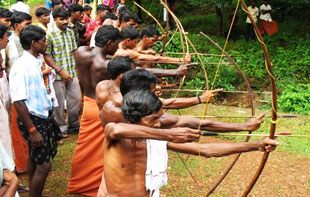Kerala.com Travel Division
WorldViewer Dot Com (India) Pvt. Ltd.
II Floor, G 66, Elders Forum Road
Panampilly Nagar, Cochin, Kerala, India
Pin - 682 036
Mobile: + 91 98460 43403
Mobile: + 91 93886 40364

<< Kerala Traditions and Rituals
 Wayanad - the green paradise or the border world of the greener part of Kerala is a quiet place where scenic beauty, wild life and traditions matter, simplicity is a virtue and beauty still blossoms from the mountainous horizon and from the green glaze of alluring vegetation.Clean and pristine, enchanting and hypnotizing, this land has a history and mystery, culture and social epistemology yet to be discovered. Located at a distance about 76 km. from the sea shores of Calicut in the Western Ghats, this station is full of plantations, forests and wildlife. Wayanad hills are contiguous to Mudumala in Tamil Nadu and Bandipur in Karnataka, thus forming a vast land mass for the wild life to move about in its most natural abode.Moreover, it is a tribal abode where hordes of tribes co-exist, each having their own unique traditions and rituals.
Wayanad - the green paradise or the border world of the greener part of Kerala is a quiet place where scenic beauty, wild life and traditions matter, simplicity is a virtue and beauty still blossoms from the mountainous horizon and from the green glaze of alluring vegetation.Clean and pristine, enchanting and hypnotizing, this land has a history and mystery, culture and social epistemology yet to be discovered. Located at a distance about 76 km. from the sea shores of Calicut in the Western Ghats, this station is full of plantations, forests and wildlife. Wayanad hills are contiguous to Mudumala in Tamil Nadu and Bandipur in Karnataka, thus forming a vast land mass for the wild life to move about in its most natural abode.Moreover, it is a tribal abode where hordes of tribes co-exist, each having their own unique traditions and rituals.
Monogamy appears to be the general rule among the Paniya community. In marriage, bride price is practised like many other tribal communities. Widow remarriage is allowed. They do not practise pre-puberty marriage.They have only a crude idea of religion. Their major deity, is called Kali. They also worship the Banyan tree. They hesitate to cut these trees as it’s their belief that if anyone attempts to them, they fall sick.
The Uralikurumas choose their life partners from their tribe itself. When a person dies, they believe that the soul of the good become gods and that of the bad become devils. They worship deities as Bettu Chikkamma and Bamadu and also demons and ancestral spirits. They play the flute and drum during their festival occasions. The "Uch-alkali" is played in the month of February. Some men dance while some beat the drums and read the flute. An old man in the group performs rites to their deity Bettu Chikkamma.
The Kattunaykkans worship animals, birds, trees, rocks, hillocks and snakes. They are firm believers in black magic and sorcery. They also worship their ancestors, along with worshipping Hindu deities. Untouchability had been fairly and widely practised by these tribals. They have clean food habits and keep their houses, premises and dress always clean. They are matrilineal and live in joint families, under the control of their chieftain called Pittan. The members of the extended family work together and put their earnings in the same purse. The Kurichiyans prefer cross-cousin marriages to any other marriage alliances. They do not practise polyandry.
No punitive measure (like ostracizing of the sex offender, as one can see among Kurichias) is prevalent among the Adiyas for sex offences. Even if their woman commits such offences they are allowed to undergo purificatory ceremony known as Kalachu Veypu to join their community back.The Adiyas are known as Ravulayar traditionally. The Adiya, like the Paniya, is one of the slave sects in Kerala. In the nuclear Adiya tribal family the husband is the head of the house. Bride price is given to the parents of the bride by the groom. porce, widow marriage etc., are permitted. Polygamy is also practised.
For information on tribal rituals and traditions in Wayanad, click wayanad culture
For details on villages in the green paradise, click wayanad villages
For Accommodation - Hotels / Resorts / Homestays in Wayanad
WorldViewer Dot Com (India) Pvt. Ltd.
II Floor, G 66, Elders Forum Road
Panampilly Nagar, Cochin, Kerala, India
Pin - 682 036
Mobile: + 91 98460 43403
Mobile: + 91 93886 40364

Kerala Districts : Alappuzha | Ernakulam | Idukki | Kannur | Kollam | Kottayam | Kozhikode | Kasargod | Malappuram | Pathanamthitta |Palakkad | Thiruvananthapuram | Trichur | Wayanad
Other Destinations :Nelliyampathy | Kodanad | Fortkochi | Marari | Kulamavu| Cherai | Kanyakumari | Kumbalangi| Kuttikanam | Ramakkalmedu|Vaikom |